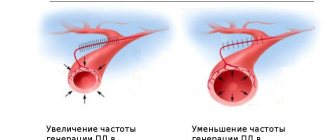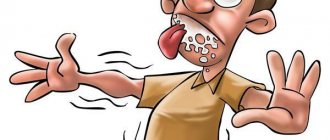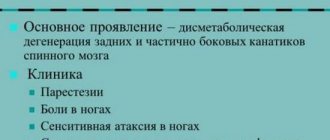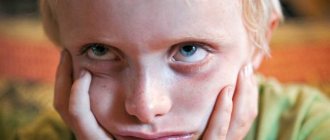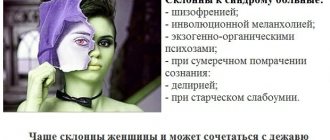Causes of attention deficit in adults
At its core, ADHD in adults is an organic disease that implies minimal dysfunction of the brain lobes and their inability to adequately perform their work. That is, organic changes are not always detected using instrumental research methods, but in most cases, modern devices can detect those minor changes that can cause signs of the disease.
The cause of the disease can occur even before the birth of the child, that is, before the mother’s pregnancy or during it. It is known that abuse of alcohol or other psychoactive substances, even several years before pregnancy, can negatively affect eggs and complicate the development of the child’s psyche. A significant role is played by the unfavorable course of pregnancy, threats of interruption, toxicosis and gestosis in different periods. The infectious diseases suffered by the child's mother while pregnant are of great importance; this increases the chance of developing brain dysfunction several times, which in the best case may manifest itself as attention deficit disorder. An important role is played by how the pregnancy ends, the presence of asphyxia at birth and in the first days of life.
The cause of the disease is also the social and living conditions of the child’s growth and development. A huge role for the development of ADHD in adults is played by the microclimate of family relationships in the family, the behavior pattern of the parents, from whom the child takes an example.
Impulsiveness
The first and most important symptom of ADD is impulsivity. What it is?
In medicine, impulsivity is defined as a lack of control over one’s behavior during certain situations. In simple words:
- An impulsive child does not respond to instructions from adults;
- Does not perform mental tasks;
- Inadequately assesses reality;
- Children show negligence, carelessness, frivolity;
- The child is not able to assess dangerous factors (an approaching car, sharp objects, impacts, etc.).
Children with ADD can harm themselves during the next manifestations of whims. Such children are very often poisoned, injured, and risk their lives and health.
Important!
To establish a diagnosis of attention deficit disorder, it is necessary to confirm 6 symptoms in a child (if the child’s age is from 6 to 12 years). If the child is over 17 years old, then 5 symptoms must be clinically proven. Moreover, painful symptoms must be present in a sick child for six months; if they go away, then this is not attention deficit disorder, but another psychological disorder.
Symptoms of the disorder
The international classification of diseases ICD-10 devotes an entire section to the nomenclature of this disease F-90.0. Each diagnosis is coded separately, depending on the predominant symptoms or their presence in general.
These signs are more relevant to children, since some of them are not observed in adulthood. It has also been proven that new symptoms appear when a person reaches adulthood. For example, in men and women in adulthood, the symptom of hyperactivity is practically not observed. This is due to the body's energy resource, which changes after growing up.
In adulthood, attention deficit in the form of instability comes to the fore. People with this symptom have difficulty performing routine daily activities. They find it difficult to clean the house, put things away, or calculate the family budget. Of course, the most significant disadvantage for this disease is the destruction of the family by constant quarrels and conflicts. This is the first thing people with ADHD complain about. The second is difficulties at work, the inability to fulfill one’s direct responsibilities. Such people are often below the line of asociality.
An adult with ADHD can be recognized by the following signs:
- difficulties in routine chores, cleaning, cooking;
- inability to pay bills on time;
- difficulties when calculating your salary or the required amount for a purchase;
- inability to listen to the end;
- difficulty maintaining tact in communication;
- forgetting to take medications regularly;
- do not carry out instructions;
- find it difficult to concentrate on work;
- there is little that can interest;
- It’s difficult to stick to one activity or hobby;
- are not capable of ambitious career moves;
- it is difficult to plan for the future and stick to the plan;
- it is difficult to draw up reports, draw conclusions and conclusions;
- it’s difficult to force yourself to analyze anything;
- absent-mindedness in daily activities;
- easily distracted by extraneous matters;
- disorganization in everyday life;
- is often late;
- are unable to save money;
- do not have long-term plans;
- it is difficult to hold spontaneous statements;
- impulsive in their actions.
People with attention deficit disorder find it very difficult to maintain normal tact in conversation, sometimes shouting thoughts out loud before they have thought about whether they would be appropriate in this case. Such an action is in the nature of an impulse and is not subject to control. Absent-mindedness is often very detrimental to work, which is sometimes done well, making it very difficult to achieve a promotion. People with attention deficit disorder have difficulty driving a car, because they need to constantly concentrate on the road, notice all the road signs and other road users, compare the picture from the rear mirrors and act according to the situation. It is very difficult for people with attention deficit disorder to read a book; the exceptions are very interesting topics that grab you from the first pages. The same applies to the film, which is very difficult to watch to the end and understand the essence. Usually there is not enough patience even for the first minutes.
Treatment and the necessary set of measures for correction
You should not expect complete relief from attention deficit hyperactivity disorder. But there are many remedies and methods that can reduce severe symptoms. Treatment for ADHD includes medication, diet, psychotherapy, behavior modification, and other methods.
Drugs that have an effect on concentration and reduce impulsivity and hyperactivity in ADHD: Methylphenidate, Cortexin, Pantogam, Cerebrolysin, Piracetam, Phenibut, Dexedrine. Their exposure time is up to 10 hours.
Article on the topic: Folk remedies for fever in children and adults - the most popular and effective recipes
Children under 6 years of age should take these medications with extreme caution, because at an early age there is a high risk of developing allergic reactions, insomnia, tachycardia, decreased appetite, and dependence on medications.
It is recommended to use a special diet with limited intake of certain foods. The diet is developed by the doctor individually for each patient.
Massage of the head and neck-collar area, physiotherapy, psychotherapy, physical therapy, and the use of infusions of medicinal herbs (pine bark, mint, ginseng, St. John's wort) will be of great benefit.
The following methods for correcting and improving the condition of their child are recommended for parents of children with ADHD:
- Develop self-control and responsibility in your beloved child . It is necessary to instruct the child to perform simple household chores: taking out the trash, going to the store for bread, washing shoes, watering flowers. In a special diary, you can celebrate children's successes during the day and assign appropriate rewards for them.
- Strictly follow the daily routine . It is necessary to teach the child to get up, walk, eat, do business and go to bed at the same time. It is forbidden to stay in front of television and computer screens for a long time, this increases overstimulation.
- Set boundaries for behavior . The child must learn once and for all what can and cannot be done. Children with ADHD must learn to independently cope with the problems and difficulties inherent in their age. Moreover, the requirements for such children should not be lower than for healthy peers. Under no circumstances should you treat your child as if he were sick.
- Develop interest in activities . It is important for a child to feel successful, skillful, and self-confident. If your beloved child has difficulty with school knowledge, then you should not demand high performance from him in all subjects. It is better that the child receives good grades only in the main ones.
- It is necessary to give the child the opportunity to throw out the accumulated energy . Children can benefit from long walks and physical exercises, swimming and active games in the fresh air.
Corrective process in the family
The family should be involved in the correction process for symptoms of attention deficit hyperactivity disorder:
- the child must be praised at every opportunity; it is important for him to be successful;
- the family should have a reward system for every good deed;
- the requirements for the child must be feasible for his age;
- eliminate parental pickiness;
- Sharing family time is important;
- crowds of people contribute to outbursts of hyperactivity in a child;
- Overworking a child, humiliation, anger and rudeness towards him is unacceptable;
- do not ignore children's requests;
- It is forbidden to compare the baby with peers, highlighting his shortcomings;
- it is necessary to strictly follow the recommendations of the attending physician.
Diagnosis of ADHD in adults
There is a confirmed opinion of researchers that hyperactivity does not arise in adults out of nowhere, it necessarily flows from the childhood form. Therefore, the first step in diagnosing this disease is a questionnaire to identify the presence of symptoms of this disease in childhood. Information about childhood from the person himself or from his family or friends with whom he grew up can sufficiently clarify the picture and form a clear picture of the disorder that is present in adulthood. Information about school years, academic performance and comments about behavior at that time is important. You should also pay attention to the pace and conditions of development.
The next step is a general medical examination, which will exclude the possibility of developing any somatic or neurological disease that may manifest itself with similar symptoms.
An important component of the examination of adults with this syndrome is confirmation of the presence of organic changes in the brain through the use of various types of tomographs. A distinctive feature is the absence of organic changes when examined at rest and their presence when trying to concentrate.
Only specialist psychologists will be able to conduct personality testing, determination of IQ level, and various additional tests. In this way, you can get a complete picture of the individual.
Treatment methods for attention deficit disorder in adults
To treat ADHD in adults, as well as in children, a comprehensive approach is required, including working with a psychologist, psychotherapist or psychiatrist, prescribing medications and taking a course of behavioral therapy. In general, any specialist from the above can treat such a disease, but a combination of all three would be optimal.
Psychotherapy
A mandatory component of treating an adult with this disorder is working with a psychotherapist who individually selects the method of therapy. This can be individual cognitive and behavioral therapy, which is most popular among such patients and is used to increase self-esteem and self-empowerment. Trainings for relaxation and relaxation after heavy psychological stress and stress or behavioral courses are also widely used. The latter help a person to properly organize their lifestyle, teach them how to devote time to work and rest in order to use their time as productively as possible. For adults, family psychotherapy is of great importance, during which the everyday problems of spouses are solved, considering one of them as a patient with ADHD. To normalize relations in the workforce, work training is used, which improves productivity and professional growth and can treat manifestations of the disease.
Medications
Treatment of adults in the pharmacological aspect is not much different from children, except that adults themselves control the intake of medications and, due to forgetfulness, can take the drug irregularly.
A well-known group of drugs is widely used - psychostimulants, which have proven their effectiveness and have long been included in treatment protocols in foreign countries. They significantly reduce symptoms, but are often addictive. Therefore, the regimen of taking these drugs must be carefully monitored.
Modern protocols include no less well-known nootropic drugs - drugs that stimulate brain activity and stabilize the level of thought processes and can treat attention deficit disorder.
To treat ADHD, vasodilators with anti-ischemic effects are also used, which increase blood circulation in certain areas of the cerebral cortex, thereby positively influencing the dynamics of the disease.
It should be remembered that treatment of ADHD in adults and medications should be prescribed only after an accurate diagnosis and determination of the type of disorder.
Source
ADHD Treatment
It is impossible to completely get rid of this mental disorder. But there are methods and means by which the severity of symptoms is reduced, alleviating the patient’s condition. Treatment of attention deficit disorder includes medication, psychotherapy, behavioral correction and other methods.
Dexamfetamine, Methylphenidate, Atomoxetine are drugs with a duration of action of 4 to 12 hours. These medications increase the ability to concentrate and absorb information. Under their influence, the level of impulsivity decreases. The drugs are effective for adult patients if ADHD has been diagnosed in them since childhood, as well as for adolescents and children. There are no medications developed for those who have the syndrome only after 20 years of age. For them, the doctor prescribes therapy based on the patient’s characteristics and clinical manifestations. Drug treatment for attention deficit hyperactivity disorder should be strictly individual, very careful and prescribed by high-class specialists.
Psychotherapy complements drug treatment. During the sessions, the doctor explains to the patient about the negative impact of the diagnosis on the quality of life so that the person knows about the characteristics of his condition and learns to correct it. To correct hyperactivity, physical exercises are prescribed - experts advise choosing a sport that you can do alone. Collective options for adults and children with this syndrome are not suitable, are difficult and lead to a decrease in self-esteem.
Treatment with other methods of attention deficit hyperactivity disorder involves the use of a special diet with a certain list of restrictions. They also use daily massage, relaxation, and treatment by listening to music. People practice therapy using herbs (ginseng, St. John's wort, melatonin, pine bark) and supplements.
With such a disease, the main principle of treatment is the saying: “Do no harm.” The child is treated by both a psychologist and a psychiatrist. For children with mild ADHD symptoms, the main and sufficient role is played by the work of a psychologist with the child himself, his teachers, and parents. If a child is diagnosed with severe impairments and maladjustment in a school environment, subsequent treatment is transferred to a psychiatrist.
The syndrome refers to such human problems that are not expressed by any severe mental dysfunction. But this disorder leads to maladjustment of an adult or child and is the starting point for the emergence of problems in the future. According to studies, 92% of adult patients with this syndrome who began therapy at 18 years of age or older are annoyed that they were not treated for this problem in childhood.

